2021 ISDDE Virtual Conference
Introduction
Before you get started if you are new to ISDDE you might like to watch this short introductory video.
The ISDDE Prize
The Bell Burkhardt Daro Shell Centre Trust funds the annual ISDDE Prize (of US$5,000) for well documented excellence in STEM design. The overriding criterion for the prize is recognition of excellence by a wide range of designers and users. The ISDDE Prize committee were unaimous in their decision to award the 2020 prize to Professor Joe Krajcik of Michigan State University whose excellence in design of science education products is recognised around the world. Below you can view the announcement of this award and hear Joe talk about some of how design principles. ISDDE looks foward to welcoming him to give further insights into his work at the next ISDDE face-to-face conference.
Far East Time Zone
Europe/Africa Time Zone
Americas Time Zone

Far East Time Zone
Theme: Understanding the user
The Far Eastern Zone of the conference had the theme of designing with the user in mind.
Two plenary presentations addressed what it means to design education materials with the teacher in mind and with then with the student in mind. A collection of shorter design stories showcased examples of excellence in designing for specific needs of users, with contributions from across multiple countries.
_________________________________________________________________________________________
Plenary session 1 – Designing with Teachers in mind – Design of education materials with the teacher in mind.
Michael Bloom – Strategy Director, FOLK
Teachers use educational resources differently. This was the focus of a collaborative project between Folk, a strategic design company, and Primary Connections, an education program at the Australian Academy of Science. Primary Connections wanted to explore how the program could improve its impact through digitisation. Folk conducted a study to observe how teachers interacted with resources and where capability development played a role. Part of the outcome from the research identified different ways that teachers wanted to engage with resources and learning content for themselves.
Presenters:
Key Presenter – Michael Bloom – Strategy Director, FOLK
Supporting Presenters – Claudette Bateup (Director Education, Australian Academy of Science) and Nicola Dziadkiewicz (Primary Connections Program Manager, Australian Academy of Science)
Michael Bloom is the Strategy Director at Folk, a strategic design consultancy. He helps organisations to deliver better products and services by understanding their customers and leveraging technology to deliver better experiences. His work focuses on the education, health, human services and professional services sectors.
Plenary Session 2 – Designing with Students in Mind – Design of Replacement Units
Associate Professor Yew-Hoong Leong (National Institute of Education Singapore (NIE))
What is a suitable “unit” of design – a lesson or a unit of (4-6) lessons? This talk will focus on the latter. The highlight is in the design process of “Replacement Units” which involve sustained collaborative work between teacher educators and teachers in realising ambitious-realistic goals in actual classroom settings.
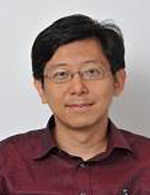 Yew Hoong has been involved in educational design work within professional development contexts for over a decade. He was recently involved in a sizeable project on the enactment of the mathematics curriculum by Singapore secondary teachers that included a strand on the teachers’ design of instructional materials. He is an editor of the upcoming special issue in the Mathematics Education Research Journal on “Teachers as designers of instructional materials”.
Yew Hoong has been involved in educational design work within professional development contexts for over a decade. He was recently involved in a sizeable project on the enactment of the mathematics curriculum by Singapore secondary teachers that included a strand on the teachers’ design of instructional materials. He is an editor of the upcoming special issue in the Mathematics Education Research Journal on “Teachers as designers of instructional materials”.
_________________________________________________________________________________________
Design Stories
In this session, four concurrent ‘design stories’ were presented. These particular stories focus on examples of designing with teachers and students in mind.
- Just Do Math: Mathematical grounding activities and a transformative cascade professional development model – Dr. Kai-Lin Yang (National Taiwan Normal University)
In this talk, I present a Just Do Math program in Taiwan. The presentation explores the underlying rationale, the features of mathematical grounding activities (MGAs) used for motivating students’ learning of mathematics and developing their mathematical ideas, and implementation of a transformative cascade model for cultivating different roles of teachers participating in this program. - Indigenous Perspectives in the Mathematics Curriculum – Caty Morris (Australian Curriculum and Reporting Authority, Australia)
We present our design story in developing over 130 content elaborations in Aboriginal and Torres Strait Islander histories and cultures for the Australian Curriculum: Mathematics. Our process is outlined providing insight into the extensive research, and the conceptual frameworks we used that underpin the rich contexts and mathematical thinking/understandings explored through the elaborations and the challenges along the way. - Emergent Modelling: From playing games to learning mathematics – Ariyadi Wijaya (Department of Mathematics Education, Universitas Negeri Yogyakarta Indonesia)
This presentation summarizes results of studies on the use of games for learning mathematics. The studies are aimed to describe how playing games can be used as a stepping stone to develop conceptual understanding of mathematics. The games described in this presentation are traditional or conventional games which are common in students’ daily life. Gravemeijer’s (1994) level of emergent modeling was used as the key reference to describe how students’ understanding develop from situational level – i. e. the world of the games – to formal level as the world of mathematics. Examples from elementary to senior high school levels are presented. An example from elementary school level shows how students’ understanding gradually shifts from playing marble to the concept of identical unit of standard measurement. Similarly, the use of Sudoku and Snake-and-ladder games in junior high school bring student from discussing the game playing to grasping the idea of random events and probability. Lastly, a role-playing game in senior high level could support students’ modelling activity and also mathematical creativity. To conclude, the studies reported in this presentation show the great potential of games to develop students’ conceptual understanding of mathematics. A video of this presentation can be found here. - Professional Learning Maps in Digital Technology – Martin Richards (Education Services Australia, Australia) & Rebecca Vivian (University of Adelaide, Australia)
Understanding the needs of your audience is central to the design of any service or product. In this short talk Martin and Rebecca discuss the approach taken to better understand their audience, their needs and how website design endeavours to meet these requirements. One approach we use centres around establishing user personas and then developing a journey map which outlines opportunities to cater for the needs of each type of user. Participants can apply the approaches to their own design and development.
VIDEO HERE A video of this presentation can be found here.

Europe/Africa Time Zone
Theme: Designing for this day and age
The Europe/Africa sessions addressed our rapidly changing educational world and how we can design to meet the new challenges we face in educating a world in mathematics and science where understanding of these important disciplines matters more than ever.
Plenary Session – Curriculum design for this day and age
Dr. Colin Foster, Reader in Mathematics Education in the Mathematics Education Centre at Loughborough University.
 Colin’s research interests focus on the learning and teaching of mathematics in ways that support students’ conceptual understanding. He is particularly interested in the design of classroom tasks that enable students to develop the necessary fluency in mathematical processes that will support them in solving mathematical problems.
Colin’s research interests focus on the learning and teaching of mathematics in ways that support students’ conceptual understanding. He is particularly interested in the design of classroom tasks that enable students to develop the necessary fluency in mathematical processes that will support them in solving mathematical problems.
Designing a completely free, fully-resourced, coherent, research-informed school mathematics curriculum
In my presentation I outline the early stages in the design work that we are doing now in the Mathematics Education Centre at Loughborough University to try to envisage how we might design a completely free, fully-resourced curriculum for lower-secondary school mathematics. I explain the contextual features of school mathematics resourcing in England which lead us to think that this is a timely and important thing to do, and share the design principles we have arrived at from the research literature. I also share our emerging attempts to map out a way forward.
“Meet the designer” interviews.
➔ Join here: Designer interviews
This session provided an opportunity to watch interviews with three designers who consider designing for this day and age from three different perspectives.
Dr. Nellie Mbano, University of Malawi, Malawi – Science Education
Professor Zsolt Lavicza, Johannes Kepler University Linz , Austria and Geogebra developer – Mathematics Education
Professor Rupert Wegerif, Cambridge University, UK, – provided insights into design vision in relation to his work as Director of the newly lanched Digital Education Futures Initiative
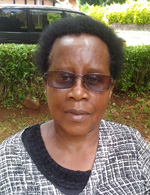 Dr. Nellie Mbano
Dr. Nellie Mbano
Nellie is a senior lecturer in the Department of Curriculum and Teaching Studies, Faculty of Education, Chancellor College, University of Malawi. She has a PhD in Science Education and teaches biology education. Her research interests include teaching thinking skills, gender and science education and building communities of practice in science education. She has coauthored secondary school biology textbooks.
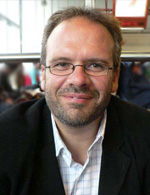 Professor Zsolt Lavicza
Professor Zsolt Lavicza
Zsolt has worked on several research projects examining technology and mathematics teaching in classroom environments in Michigan and Cambridge. In addition, Zsolt has contributed greatly to the development of the GeoGebra community and participated in developing research projects on GeoGebra and related technologies worldwide. Currently, he is Professor in STEM Education Research Methods at Johannes Kepler University’s Linz School of Education where he works on numerous research projects worldwide related to technology integration into schools. Zsolt leads the doctoral programme in STEM Education; teaches educational research methods worldwide; and coordinates research projects within the International GeoGebra Institute.
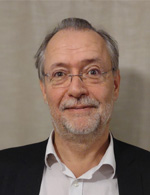 Professor Rupert Wegerif
Professor Rupert Wegerif
Rupert is Professor of Education at the University of Cambridge and director of the Digital Education Futures Initiative at Hughes Hall, Cambridge. His research focuses on designing education for dialogue in the context of the Internet Age. He researches dialogic theory in education and ways of teaching through dialogue and teaching for dialogue in classrooms with technology. He is co-lead with Sara Hennessy of the Cambridge Educational Dialogue Research group (CEDiR) and co-convenor of the argumentation, reason and dialogue Special Interest Group (SIG) of the European Association of Research on Learning and Instruction (EARLI).
Panel and discussion: Designing for a more equitable future
Panelists give brief thought-provoking insight into “Designing for a (more) equitable future”.
Panelists:
Dr. Marta Romero Ariza, Universidad de Jaén, Spain – Science Education
Faith Moynihan, designer, Desmos – teaching and learning mathematics digital platform. USA
Dr. James Calleja, University of Malta, Malta – Mathematics Education
Dr. Lynn Bowie, Visiting Associate, Wits University, South Africa
 Dr. Marta Romero Ariza
Dr. Marta Romero Ariza
Marta Romero Ariza is Associate Professor at the Department of Didactics of Sciences in the University of Jaen, passionate about science and education. She accompanies teachers in the process of improving STEM teaching and learning through design-based research.
Designing for meaningful participation in today’s society
What does a person need to appreciate, learn and being able to do in relation to science and mathematics to fully participate in today’s societies? Does a unique design meet everyone’s needs and capacities? Are we working on an equitable future for all? How could we bring authenticity and relevance into STEM educational design? Is there space for co-design and co-creation?
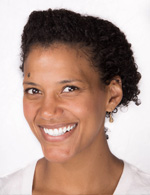 Faith Moynihan
Faith Moynihan
In her career as a math teacher, Faith has taught in a diverse set of schools. In each of her classrooms Desmos has been the equalizer that helped ignite curiosity and spark rich, mathematical conversations. At Desmos Faith brings her passions to life by creating delightful lessons for students and teachers to use math to explore and represent the world around them.
Technology and curriculum design for equitable classroom experiences.
How do we create an equitable learning culture where all students see themselves as powerful and valuable learners? Faith explores ways technology and curriculum design can help us elicit, celebrate, and build on student thinking to foster more equitable classrooms.
 Dr. James Calleja
Dr. James Calleja
James Calleja PhD (Nottingham, UK) is a lecturer at the Faculty of Education, University of Malta. He leads the Collaborative Lesson Study Malta (www.clestum.eu) project and his research interests include mathematics education, teacher learning, lesson study and the design of continuing professional development.
Designing professional development for just-in-time learning
The concept of just-in-time learning (JITL) involves providing support that is responsive and applicable to the needs of educators. In this presentation, JITL and its application to professional development (PD) programmes is discussed, and suggestions for PD designers to give explicit attention to JITL is offered.
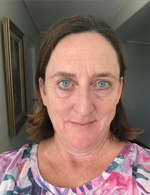 Dr. Lynn Bowie
Dr. Lynn Bowie
Lynn Bowie is a Visiting Associate at the University of Witwatersrand and the mathematics coordinator at OLICO Mathematics Education, an NGO supporting learners in South African schools in mathematics. She holds a PhD in Mathematics Education and has taught mathematics at all levels from primary school through to university mathematics.
Designing against disadvantage
In South Africa the poorest 60% of students are estimated to be about 4 years behind their expected grade level in Mathematics by the time they enter high school. In combination with this schools are bound to follow a prescriptive national curriculum (both in scope and sequencing) which means these learners often face content they do not have the prerequisite knowledge to deal with. Lynn discusses the design of a learning programme aimed at supporting learners to succeed in high school Mathematics that navigates the tensions imposed by these competing demands.

Americas Time Zone
Theme: Designing for equity
Our Americas zone focused on equity in educational design. It explored the challenges that designers meet in seeking racial equity and social justice in mathematics and science education.
Plenary Session – Challenges for designers seeking racial equity and social justice in mathematics education
Robert Berry, University of Virginia, USA.
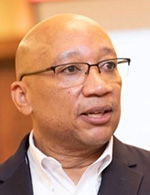
Robert Q. Berry III Ph.D. is the Samuel Braley Gray Professor of Mathematics Education, the Associate Dean of Diversity, Equity, and Inclusion in the School of Education at the University of Virginia, and the immediate Past President of NCTM. His research and teaching focuses on equity issues in mathematics education.
Panel and discussion
The panel consists of short contributions from a panel of 5 educational designers from the field with each providing a short short inspiring presentation of how they have been designing for different aspects of equity.
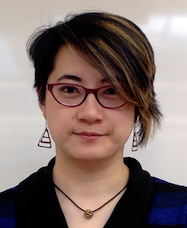 Xi “CiCi” Yu
Xi “CiCi” Yu
Xi Yu is a High School Math Teacher in Cambridge Public Schools. She co-founded Play With Your Math and is starting to blog at DismantlingMathematics.com.
Equitable engagement and community building strategies when webcams aren’t on
Since the beginning of the COVID-19 pandemic in the United States, many colleagues reported having trouble engaging with students who chose not to turn on their webcams for virtual class. Rather than mandate that students turn on their webcams, which opens up a slew of equity issues, I developed a collection of engagement and community-building strategies for virtual learning without the need for webcams.
 Eli Luberoff
Eli Luberoff
Eli Luberoff is the Founder and CEO of Desmos, Inc., a math technology company used by millions of students and teachers around the world. Before Desmos, Eli founded a tutoring software platform, and studied Math and Physics at Yale.
Equity in design product and designing processes
By repeatedly asking “what voices are missing?” and “who might this harm?”, at Desmos we aim to build equitable products but also equitable structures inside and outside of our organization. This has led to updating our list of example mathematicians, building accessibility for vision-impaired and blind students, and building hiring processes that counter systemic bias in the tech industry.
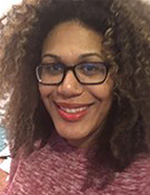 Dr. Crystal Menzies
Dr. Crystal Menzies
Crystal Menzies is a Postdoctoral Research Associate at the Learning Research and Development Center, where she focuses on equity in mathematics instruction and instructional coaching. Her research and design work specializes in operationalizing Community Cultural Wealth in diverse educational contexts.
Resolving the conflict in being culturally responsive across wildly varying cultural contexts
The presentation describes design strategies that were used to insure maintaining high quality outcomes in a college access curriculum that was meant to be national in scope but culturally responsive in character across wildly varying cultural contexts.
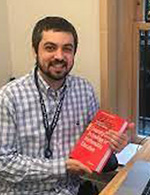 Dr. Benjamin Dickman
Dr. Benjamin Dickman
Benjamin Dickman received his Ph.D. in Mathematics Education from Columbia and was as a Postdoc at Boston University. Benjamin is currently a math teacher and teacher coach at a girls day school in New York City.
Centering teaching tolerance social justice standards in an Algebra 2 course
A wide range of factors demand a rethinking of how mathematics courses are designed. I have incorporated the Teaching Tolerance Social Justice Standards into an Algebra 2 course while continuing to deepen student algebraic content knowledge.
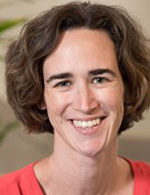 Dr. Eve Manz
Dr. Eve Manz
Dr. Manz works closely with elementary teachers, instructional leaders, and interdisciplinary teams of researchers to develop new approaches to science teaching and learning that center student and teacher sense-making. Her work has been funded by the James S. McDonnell Foundation, the Kellogg Foundation, and an early career research grant from the National Science Foundation.
Elementary science units that integrate criticality and justice within full day curricula
I describe curriculum units created by an interdisciplinary team that (1) honor the diverse perspectives and experiences children bring to science and engineering, (2) help them connect science and engineering to meaningful questions, projects, and products, and (3) foster attention to criticality and justice from the earliest years of schooling.
